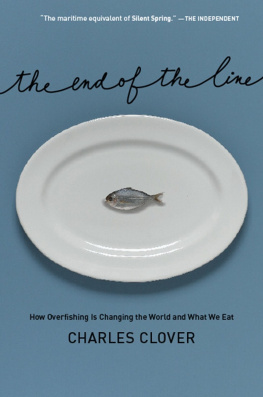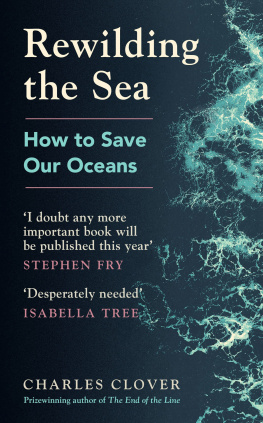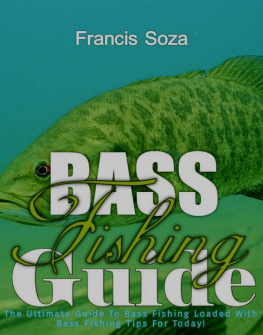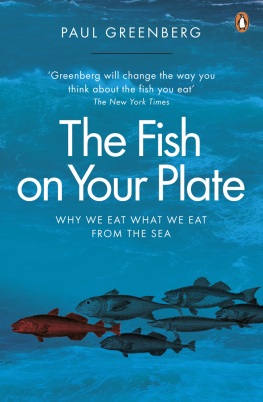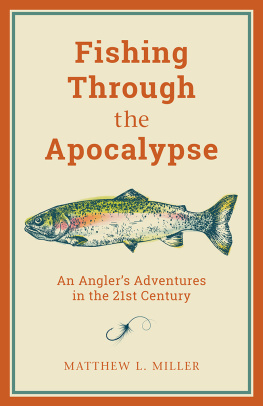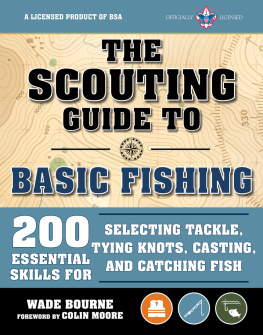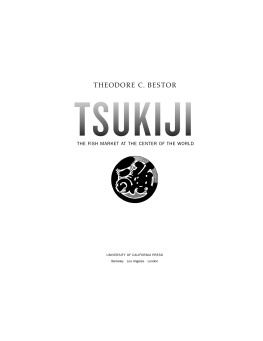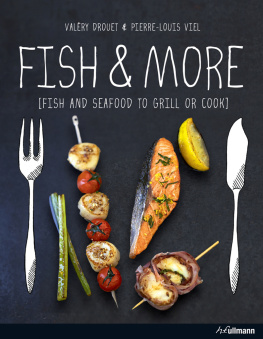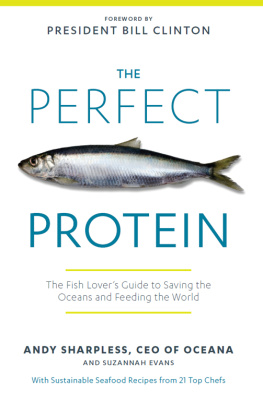CONTENTS
Well researched... We must act now before the world runs out of fish. HRH The Prince of Wales
Devastating... a succinct and powerful crash course on the pressing environmental issues surrounding fish that should send consumer awareness soaring. Daily Mail
This book made me feel sick. It also, equally effectively, made me feel ashamed, despondent and anxious, increasingly disenchanted with our politicians and, above all, guilty... invaluable book. Financial Times
An amazingly good read... anyone who loves to eat fish will be fascinated, appalled and challenged by this book. Eating fish will never be the same again. Country Life
Mr Clovers excellent book. Little escapes him... his counsel seems eminently wise. The Economist
A book to make you do more than think. Country Living
You will never look at a fish supper in the same way again. The Economist
The End of the Line
How Overfishing is Changing the World and What We Eat
Charles Clover

For Harry and Jack
INTRODUCTION THE PRICE OF FISH
IMAGINE WHAT PEOPLE would say if a band of hunters strung a mile of net between two immense all-terrain vehicles and dragged it at speed across the plains of Africa. This fantastical assemblage, like something from a Mad Max movie, would scoop up everything in its way: predators, such as lions and cheetahs, lumbering endangered herbivores, such as rhinos and elephants, herds of impala and wildebeest, family groups of warthog and wild dog. Pregnant females would be swept up and carried along, with only the smallest juveniles able to wriggle through the mesh.
Picture how the net is constructed, with a huge metal roller attached to the leading edge. This rolling beam smashes and flattens obstructions, flushing creatures into the approaching filaments. The effect of dragging a huge iron bar across the savannah is to break off every outcrop, uproot every tree, bush and flowering plant, stirring columns of birds into the air. Left behind is a strangely bedraggled landscape resembling a harrowed field. The industrial hunter-gatherers now stop to examine the tangled mess of writhing or dead creatures behind them. There are no markets for about a third of the animals they have caught because they dont taste too good, or because they are simply too small or too squashed. This pile of corpses is dumped on the plain to be consumed by carrion.
This efficient but highly unselective way of killing animals is known as trawling. It is practised the world over every day, from the Barents Sea in the Arctic to the shores of Antarctica, and from the tropical waters of the Indian Ocean and the central Pacific to the temperate waters off Cape Cod. Fishing with nets has been going on for at least 10,000 years since a time when hunters pursued other humans for food and killed woolly mammoths by driving them off cliffs. Yet because what fishermen do is obscured by distance and the veil of water that covers the Earth, and because fish are cold-blooded rather than cuddly, most people still view what happens at sea differently from what happens on land. We have an outdated image of fishermen as bearded adventurers in the mould of friendly Captain Birds Eye, not as overseers in a slaughterhouse.
Eating fish is fashionable and it is consumed with far less conscience than meat. Even many vegetarians see no irony in eating fish. It has become a kind of dietary talisman for Western consumers. Nutritionists tell us that fish is good for us the best source of fat-free protein and vitamins and that the omega-3 fatty acids in oily fish give optimum brain function, reduce the danger of heart attacks and strokes, and delay the onset of arthritis and osteoporosis. Studies even indicate that consuming fish slows down the ageing process and can help us lose weight because a fishy diet switches off our hunger hormone, making us feel satisfied on smaller, more nutritious, amounts of food. Skinny models, whom we are encouraged to admire as the ideal shape for the human form, dont need to smoke to stay skinny, but can be satisfied on bird-like portions. All they have to do is eat fish.
Unfortunately, our love affair with fish is unsustainable. The evidence for this is before our eyes. We have seen what industrial technology did to the great whales, the hunting of which is now subject to a worldwide, but not total, ban. I believe we are about to cross another watershed in public thinking namely, what industrial techniques, unchecked market forces and lack of conscience are doing to inhabitants of the sea. On land a watershed was reached in farming when sprays, fertilisers, food additives and battery-farming techniques used in the raising of crops and animals led to the collapse of farmers reputations as custodians of the countryside and guardians of the quality of food we eat. The farmers image is only slowly being rebuilt, amid much suspicion.
Fish were once seen as renewable resources, creatures that would replenish their stocks forever for our benefit. But around the world there is evidence that numerous types of fish, such as the northern cod, North Sea mackerel, the marbled rock cod of Antarctica and, to a great extent, the west Atlantic bluefin tuna, have been fished out, like the great whales before them, and are not recovering. Reassurance from official sources on both sides of the Atlantic that the seas are being managed scientifically is increasingly hard to believe. Enforcement of the rules that are meant to prevail in the oceans has proved wanting almost everywhere. Even in some of the best-governed democracies, experts admit that overfishing is out of control.
The perception-changing moment for the oceans has arrived. It comes from the realisation that in a single human lifetime we have inflicted a crisis on the oceans greater than any yet caused by pollution. That crisis compares with the destruction of mammoths, bison and whales, the rape of rainforests and the pursuit of bush meat. It is caused by overfishing. As a method of mass destruction, fishing with modern technology is the most destructive activity on Earth. There is no exaggeration in saying that overfishing is changing the world. Just as the deep sea has become the last frontier, its inhabitants a subject of fascination to film-makers, so creatures of the shallow seas, such as sharks and sea horses, are on a slide to extinction. Overfishing threatens to deprive developing countries of food in order to provide delicacies for the tables of rich countries, and looks set to deprive tomorrows generations of healthy food supplies so that companies can maintain profitability today.
As traditional fish stocks crash and others are found as substitutes, overfishing is altering our diet. It is even altering evolution: the North Sea cod has begun to spawn at an earlier age in response to the pressure of fishing. Overfishing has been, and no doubt will be again, a cause of war and international disputes. It is a force in world trade and international relations, and a corrosive agent in state and community politics.
This book argues that, as a result of overfishing, we are nearing the end of the line for fish stocks and whole ecosystems in the worlds oceans, and that it is time we arranged things differently. It takes the form of a journey around the world that I made in several stages and forms the record of many conversations about the problems and potential solutions many of these as controversial as the problems. It reveals the extent of what is happening in the oceans in our name while satisfying our appetite for fish, and shows the true price of fish that isnt written on the menu.
Next page
